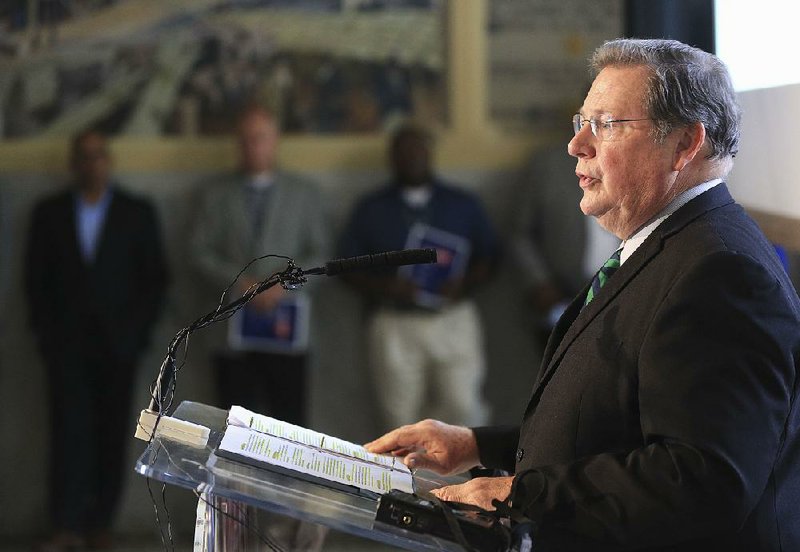Little Rock will soon file paperwork with the federal government stating that it has "functionally" ended veteran homelessness in the city.
Mayor Mark Stodola announced at his most recent state of the city address that the Mayor's Task Force on Ending Veteran Homelessness, established in 2016, has done the work necessary to meet federal guidelines for ending veteran homelessness.
This doesn't mean that there are no homeless veterans in the city, but that all homeless veterans have been identified and can move quickly into housing, said Pat Dahlgren, program director for the city's Supportive Services for Veteran Families site.
The 2017 Central Arkansas Team Care for the Homeless census of the homeless in Lonoke, Prairie, Pulaski and Saline counties showed that there were 123 homeless veterans, including those living outside, in shelters and in transitional housing, in the metropolitan area.
"Actually what it is is that the area has demonstrated that they have the capacity to house veterans if and when they become homeless," said Dahlgren.
St. Francis House Ministries was selected as the supportive services site and got $904,775 in 2018 from the federal government to serve in this role. It offers a housing program designed to help homeless veterans with post-traumatic stress disorder re-enter society.
Five criteria set by the United States Interagency Council on Homelessness outline the specific standards for having "functionally zero" veteran homelessness:
• Identify all homeless veterans.
• Provide shelter immediately to any homeless veteran.
• Prove service-intensive transitional housing in limited instances.
• Assist veterans to move quickly into permanent housing.
• Have resources and plans in place in case a veteran becomes homeless.
Stodola said the city will file the paperwork this month. There are about 50 communities -- including the entire states of Connecticut, Delaware and Virginia -- that have filed the paperwork. No other Arkansas cities have completed this goal, according to the United States Interagency Council on Homelessness website.
"I think it will put us in a unique distinction of one of very few cities in the country that have met the objectives set out by HUD," Stodola said, using the acronym for the U.S. Department of Housing and Urban Development.
He joined the Mayor's Challenge to End Homelessness, which began in 2014, and later formed the action group. The action group consists of representatives from the Veterans Affairs Day Center, St. Francis House Ministries, the local housing authority and the Little Rock Landlord Association, among others. The group meets monthly.
One important component of reaching this goal has been education, Dahlgren said. She has presented facts about veteran homelessness and specific needs to landlords as well as her own staff.
This was paired with an effort to streamline the process of getting veterans -- especially those who are chronically homeless -- into public housing, said Estella Morris, program manager with the Veterans Day Treatment Center.
"Chronically homeless" is defined by HUD as anyone who has been homeless for a year or more or has had four or more episodes of homelessness over three years.
Morris said she works with the Metropolitan Housing Alliance to expedite inspections once a veteran has chosen a unit to live in so that a voucher can be issued more quickly. Veterans can typically be housed within 90 days, she said.
Veterans who use vouchers have to simultaneously use case management services offered through local Veterans Affairs offices, Morris said. Over the years, changes in federal legislation have made it easier to take a targeted approach at ending chronic homelessness.
In 2008, her group was allowed to start working with veterans who had criminal convictions, so they could reach them "before their boots hit the ground," she said.
Moving the day center first to its location on Second Street and in 2013 to the Main Street location has also been helpful because it is now closer to its clientele, Morris added.
"The impact of all of those things on where we are now is that as a result of all of our attention over the past 31 years, and the focus on the chronically homeless, we've been able to reduce those numbers [of homeless veterans] significantly," she said.
Members of the task force keep a master list of all the identified homeless veterans, and those who are considered chronically homeless. They call every week to check in on that group, and last week all six on the list were connected with a program.
"I think it's important work that has been going on and I know the VA has been trying for a long time on this issue," Dahlgren said. "Hopefully we will be successful in getting our application approved, and we will see what happens."
Metro on 04/03/2018

